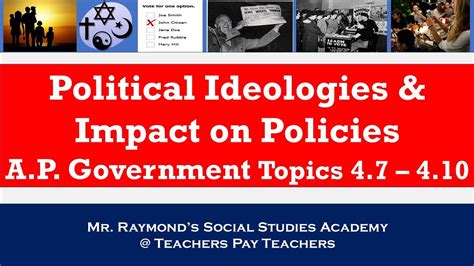Defining Ideology
An ideology is a comprehensive system of beliefs, values, and principles that shape a person’s or group’s political views and actions. It offers a coherent framework for understanding the world, including its problems and solutions. Ideologies can encompass a wide range of issues, such as economic policy, social justice, environmental protection, and international relations.

Key Characteristics of Ideologies
- Comprehensiveness: Ideologies provide a holistic perspective on politics and society. They extend beyond specific policies to encompass a broader worldview.
- Belief Systems: Ideologies are grounded in a set of fundamental beliefs about the nature of human beings, society, and the role of government.
- Values: Ideologies prioritize certain values, such as freedom, equality, or social order.
- Principles: Ideologies guide political action through a set of principles that dictate how problems should be addressed.
- Dynamic: Ideologies evolve over time in response to changing social, economic, and political conditions.
Ideologies in AP Government
In AP Government, ideologies are categorized into three broad groups: conservatism, liberalism, and socialism. These ideologies have their own distinct beliefs, values, and principles that shape their political positions.
Conservatism
Conservatism emphasizes the preservation of traditional values, institutions, and principles. Conservatives generally believe in limited government interference in the economy, a strong national defense, and individual responsibility.
Key Beliefs:
– Importance of individual liberty and limited government
– Free market economics and deregulation
– Traditional values, such as family and religion
– Hierarchical social order
Liberalism
Liberalism promotes individual freedom, equality, and social progress. Liberals typically support government intervention in the economy to ensure social justice, a strong welfare state, and environmental protection.
Key Beliefs:
– Expansion of individual rights and civil liberties
– Government responsibility to provide social welfare
– Commitment to equality and anti-discrimination
– Importance of education and knowledge
Socialism
Socialism advocates for the ownership of the means of production by the community, rather than by private individuals. Socialists believe in a strong social safety net, democratic control of the economy, and the reduction of social inequalities.
Key Beliefs:
– Government ownership and control of key industries
– Emphasis on social equality and distribution of wealth
– Democratic and participatory decision-making
– Importance of social justice and collective action
Ideology and Policymaking
Ideologies play a significant role in policymakers’ decisions. By providing a coherent framework for understanding the world, they influence the priorities and solutions that policymakers consider. For example, a conservative policymaker might prioritize tax cuts and deregulation, while a liberal policymaker might focus on expanding social programs and promoting environmental protection.
Ideology and Elections
Ideologies shape voter preferences and electoral outcomes. Voters often align themselves with political parties and candidates that share their ideological beliefs. In the United States, for example, the Republican and Democratic parties are associated with conservative and liberal ideologies, respectively.
Measurement of Ideology
Ideology can be measured using a variety of methods, including:
- Attitudinal Surveys: Surveys measure individuals’ beliefs and values on specific issues, which can be used to infer their ideology.
- Political Participation: Voting patterns and other forms of political participation can provide insights into individuals’ ideological affiliations.
- Content Analysis: Analyzing political speeches, party platforms, and other documents can reveal the ideological orientation of individuals and organizations.
Conclusion
Ideology is a fundamental concept in AP Government and political science. It provides a lens through which to understand the beliefs, values, and principles that shape political behavior. By understanding the different ideologies that exist, we can gain a deeper understanding of the political landscape and the decisions that policymakers make.
